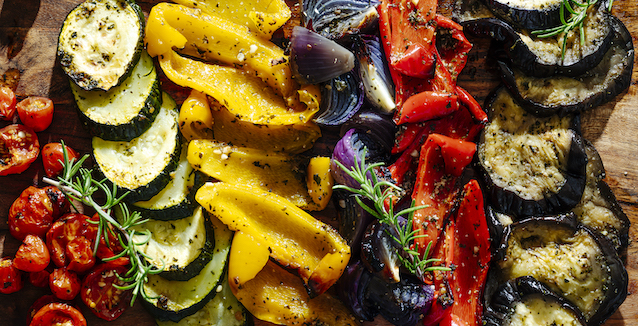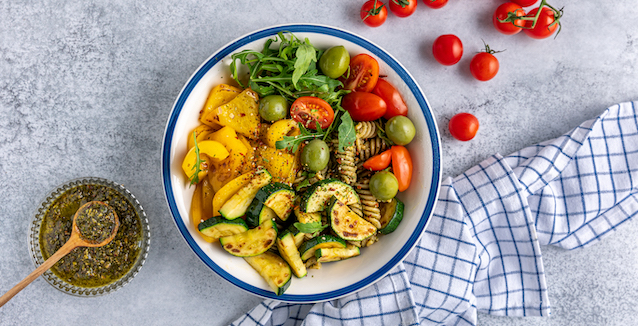
Nutrition
Exploring the Mediterranean diet
February 21, 2022
Experience the vibrant flavours of the Mediterranean with its celebrated diet. Drawing from the culinary traditions of Italy, Spain, Greece and beyond, this diet not only tantalises your taste buds but also offers numerous health benefits. Wondering what it’s all about and if it can help you lose some weight? We’ve got all the tasty details right here.
Table of contents
Origins of the Mediterranean diet
The story of the Mediterranean diet begins in the 1960s with a pivotal study exploring the links between diet, health risks and diseases. Researchers discovered that inhabitants of the Greek island of Crete enjoyed notably long lifespans and encountered few cardiovascular issues. This finding suggested that their diet was exceptionally healthy. What started as the traditional Cretan diet soon expanded into what we now recognise as the Mediterranean diet, reflecting the broadly similar culinary practices across Mediterranean countries.
Despite changes over time, with fast food becoming more common and traditional eating habits evolving, the “traditional” diet from that era continues to inspire the modern Mediterranean diet.
How does the Mediterranean diet work?
The Mediterranean diet emphasises fresh, high-fibre foods. It includes plenty of fruits, vegetables and fish, complemented by modest amounts of meat, selected oils and fresh herbs, not to mention staples like pasta, bread and rice. For us Brits, it often brings back fond memories of meals enjoyed on holiday.
More than just the ingredients, this diet celebrates the way food is prepared and savoured. In countries like Greece and Spain, mealtime is a relaxed and cherished ritual. Taking your time to eat is crucial, especially if you’re looking to lose weight with the Mediterranean diet. Eating slowly helps you tune in to your body’s natural signals of fullness, leading to reduced calorie intake without the need for strict calorie counting or significant dietary restrictions.
The Mediterranean diet is less about short-term weight loss and more about a sustainable shift to a diet rich in Mediterranean flavours, which studies suggest can lower the risk of cardiovascular diseases and even decrease the likelihood of developing Alzheimer’s disease.
How to eat the Mediterranean way
The Mediterranean diet doesn’t really impose strict restrictions. However, it does offer guidance on which foods should feature prominently in your meals and which should be occasional indulgences.
Here are the foods you can enjoy liberally:
These are not just nutritious choices but also form the cornerstone of what makes the Mediterranean diet so beneficial and sustainable over time.
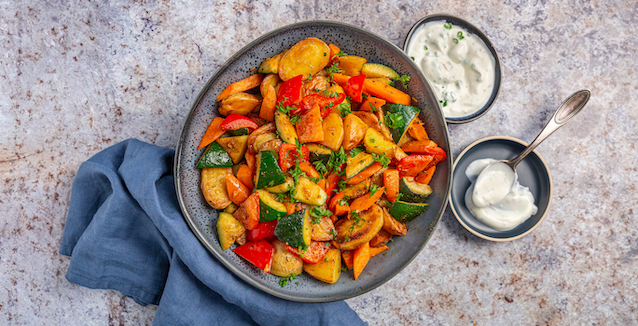

In addition to the staple foods, enjoy these items in moderation:


Occasionally, you might also treat yourself to:
These less frequent indulgences can help make the Mediterranean diet a flexible and enjoyable lifestyle choice, rather than a restrictive regimen.
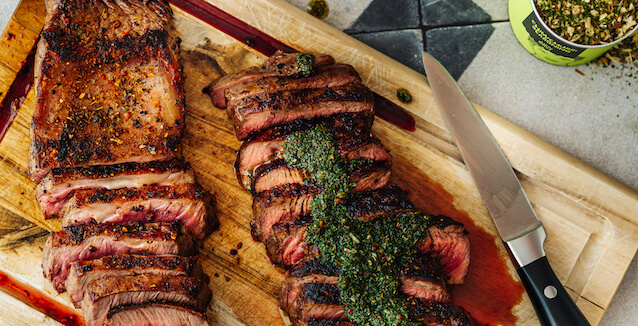

Adapting main meals and breakfasts to the Mediterranean diet
For main meals, it’s a great idea to draw inspiration from the typical menus of Mediterranean cuisines. However, breakfast in countries like Spain might not always align with the principles of the Mediterranean diet, as it often consists simply of coffee or tea accompanied by a sweet pastry.
Instead, we recommend starting your day with a nutritious breakfast bowl filled with yoghurt, fresh fruits and perhaps some nuts and seeds from our breakfast recipe collection. This kind of meal provides a balanced mix of protein, healthy fats and fibre – which crushes hunger and sets you up well for the day.
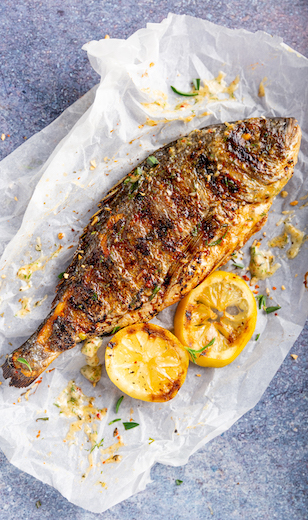

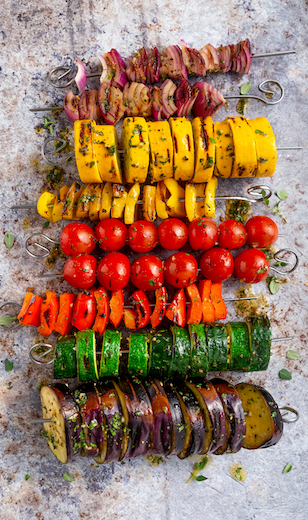

Getting started with the Mediterranean diet
Easing into the Mediterranean diet can be a smooth process by making thoughtful substitutions in your daily meals. For example, switching from cow’s milk cheese to goat’s cheese, or choosing chicken over red meat, are practical steps toward adopting this heart-healthy diet. These small changes can significantly reduce your intake of saturated fats and increase your consumption of healthier proteins and fats.
Incorporate more seafood
Another great tip for transitioning to the Mediterranean diet is to increase your intake of seafood. Aim to include fish like salmon, mackerel and sardines in your meals at least twice a week. These are rich in omega-3 fatty acids, which are excellent for heart health and overall well-being. Start with simple grilled or baked fish dishes, which are both easy to prepare and delicious.
Focus on whole grains
Instead of refined grains like white bread and pasta, opt for whole grains such as quinoa, barley, wholewheat pasta and brown rice. These whole grains contain more nutrients and fibre, which can help improve digestion and provide a longer-lasting feeling of fullness. Integrating whole grains into your diet can be as simple as swapping out your usual side dishes for these healthier alternatives.
These initial steps will help you gradually familiarise yourself with the Mediterranean diet’s components, making the transition easier and more sustainable.


Advantages of the Mediterranean diet
The Mediterranean diet is not just a short-term diet but a long-term shift towards a more balanced and nutritious way of eating. Often hailed as one of the healthiest diets, it provides an excellent supply of vitamins and minerals essential for overall health. The variety of foods included makes the transition easier, and these ingredients are readily available in supermarkets year-round, aiding in sustained adherence.
Challenges of the Mediterranean diet
However, there are some challenges to consider. The cost of fish and seafood, which are recommended to be eaten several times a week, can be relatively high. Additionally, the preparation and consumption of meals generally take more time than other diets might require. This slow and deliberate approach to eating is a core principle of the Mediterranean diet, but it can be difficult for those with busy lifestyles to implement consistently.
For those looking to lose weight, the Mediterranean diet requires patience, as it is designed for gradual and sustainable weight loss – typically no more than two kilograms a month. Also, careful attention must be paid to the quantity of olive oil used; although it’s a healthy fat, liberal use can counteract weight loss efforts.
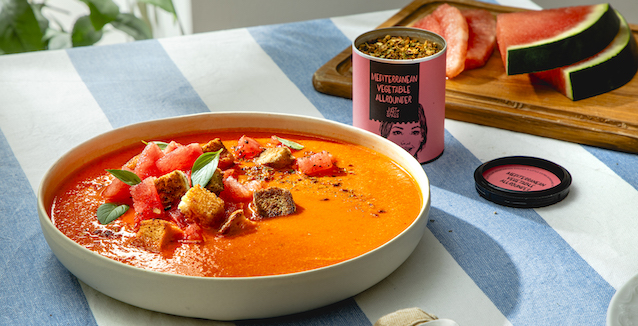

Mediterranean cooking made easy
Imagine sitting down to a meal of pan-fried fish, oven-roasted vegetables and a glass of red wine – holiday vibes for days! If you’re unsure how to bring the Mediterranean flair to your table, let us kick-start your journey with our Mediterranean Vegetable Allrounder seasoning, offering you a delicious introduction to this region’s culinary delights.






